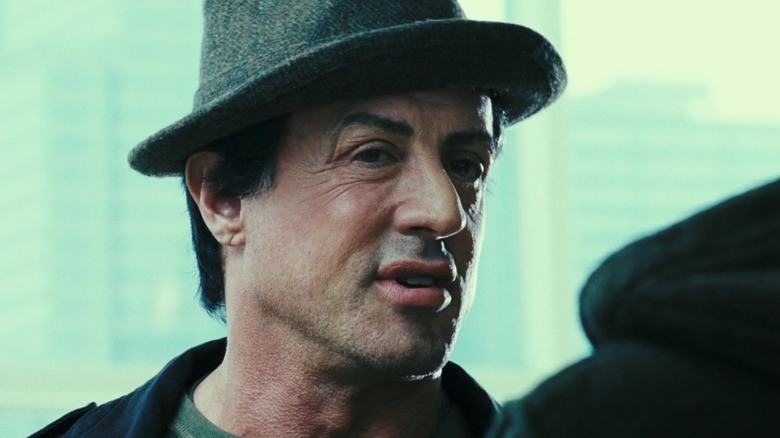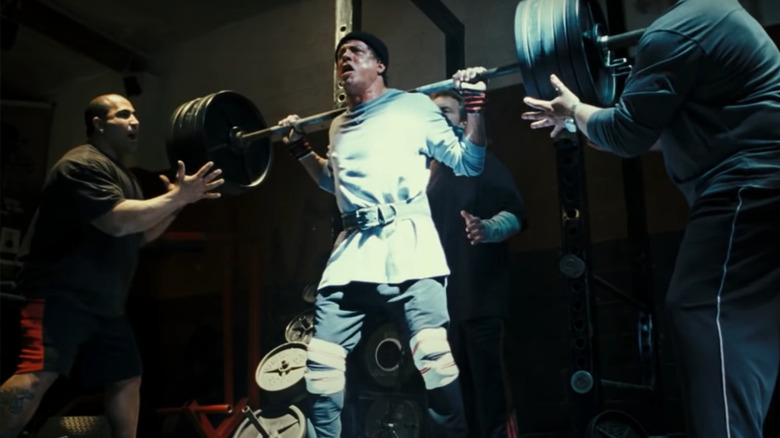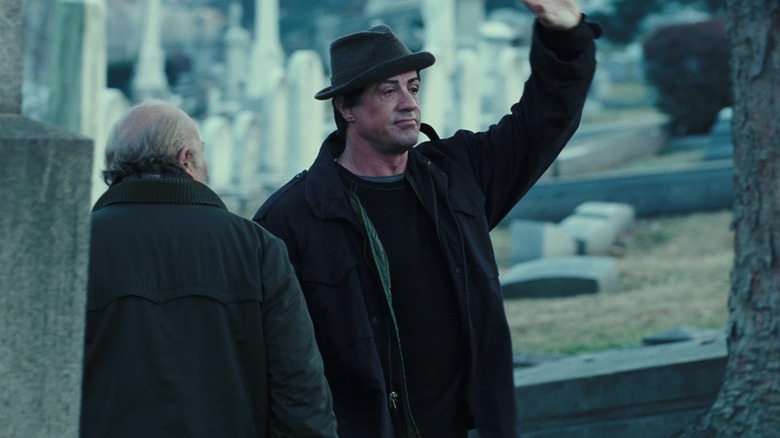Why Sylvester Stallone Agreed To Bring Back Rocky For A Sixth Movie
In the early 2000s, the gritty reboot trend was in full effect. 2005 saw Christopher Nolan pretty much invent the whole concept with "Batman Begins" and a year later, James Bond would get a similar treatment with the excellent "Casino Royale." But somewhere in there, a less likely hero returned to the screen. That return was suitably gritty, but it wasn't quite a reboot — more like a redo.
30 years after he first arrived on screens, Rocky Balboa was back with 2006's imaginatively-titled "Rocky Balboa." The movie found a downtrodden and increasingly irrelevant Rocky haunting his old stomping ground of Philadelphia in the wake of losing his beloved wife, Adrian. But despite his seeming irrelevance, as his character says in the movie, there was "still some stuff in the basement." Thus, Rocky takes to the ring one more time to prove he still has what it takes.
It was a welcome return to form for the series, which had fizzled out on somewhat of a sour note with 1990's "Rocky V." Remembered as being a bit of a misstep, the fifth installment was an anticlimactic ending for Sylvester Stallone's underdog hero. That's why it was a good thing the studio nixed the idea of a more tragic ending, because by the time Stallone felt ready to revisit the franchise, Rocky was there waiting for him.
Stallone and Rocky's stalled careers
Among Rocky movies, "Rocky Balboa" is often cited as one of the better entries. Nothing will ever top the first movie, with its classic hero's journey and '70s charm. But "Balboa" shares much of what made that first movie great, in the sense that its on-screen events mirror Stallone's own life. In the 1976 movie, Rocky's blue-collar struggles were reminiscent of Stallone's frustrations with the pressures of acting and providing for his family. In "Rocky Balboa," the aging hero is feeling the weight of being left behind by the very career he was chasing in the first movie.
At the time, Stallone himself was in a similarly wayward position. As the actor told GQ, he was faced with a "generational vortex — where you have a new crop of moviegoers that don't embrace you the way the prior generation did." His solution to that predicament was to bring back the character that had launched his career.
"The one X factor is a sequel. 'I know I'm pushing 60, and Rocky V was considered the worst, but give me one more!' What was once the bane of our existence, like, 'God, we're typecast,' it's what gave us a second shot."
It turned out to be a gamble worth taking, with "Rocky Balboa" blowing past financial expectations and receiving praise for its reflective, moving tone. It wasn't a massive blockbuster, but a $156 million dollar take on a $24 million budget proved Rocky was by no means as down and out as many had thought.
Don't ever count Rocky out
Although Stallone was ambitious to revive a career that had faded as audiences evolved, there was more to his resurrection of Rocky than that. The actor, in contrast to the view of him as a one-dimensional action star, has always had a thoughtful and insightful approach to movie-making. He authored multiple scripts, including the first six "Rocky" movies, and seemingly always maintained a love for his most popular character. In one interview, when "Rocky V" didn't turn out the way he wanted, he remarked: "I felt as though I let people down, it became an all-consuming dream to just end it the way I should have ended it that time."
Of course, "Balboa" wasn't really the ending Stallone said it was. The "Creed" movies have continued Rocky's ongoing legacy, and there was even talk of a "Rocky" prequel series being in the works, with Stallone himself once again on writing duties. There'll no doubt be more to come from Rocky, even if Stallone doesn't appear in "Creed III" come 2023. And while I thought "Creed" seemed like a fitting coda to the franchise, just as Stallone proved with Rocky's gritty redo in 2006, you can never really count the character out.


